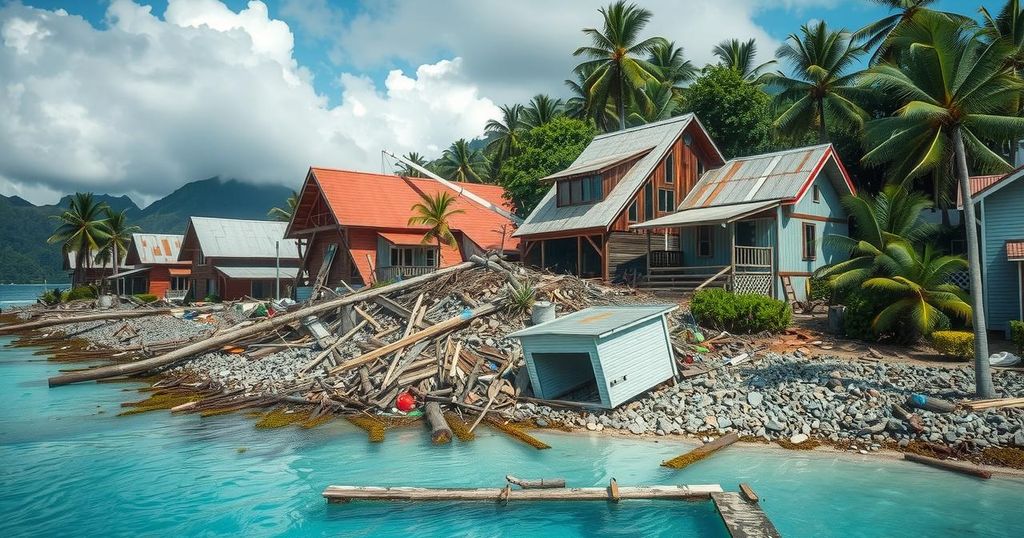Devastation of Cyclone Chido and Vanuatu Earthquake: A Humanitarian Response
Tropical Cyclone Chido has wreaked havoc on Mayotte, Comoros, and Mozambique, causing catastrophic destruction and loss of life. The cyclone, with record winds, has led to an estimated death toll in the thousands. At the same time, a 7.3-magnitude earthquake impacted Vanuatu, also causing significant damage. Direct Relief is actively responding to both disasters by providing medical supplies and support to affected regions.
Recently, Tropical Cyclone Chido struck the Mayotte archipelago, Comoros, and Mozambique, causing significant devastation and loss of life. Classified as the most powerful storm in Mayotte in over 90 years, its wind speeds surpassed 140 miles per hour, leading to catastrophic storm surges that destroyed entire neighborhoods and severely impacted the lives of undocumented migrants. Consequently, the current official death toll in Mayotte is reported at 22, yet preliminary estimates project thousands more as assessments are ongoing.
In the Comoros, President Azali Assoumani declared a week of mourning due to enormous damage inflicted on the nation’s infrastructure. Mozambique, having already been vulnerable to severe climatic conditions, incurred the full impact of Cyclone Chido, which made landfall in Cabo Delgado province. There, wind speeds exceeded 160 miles per hour, resulting in extensive damage to homes, infrastructure, and health facilities.
Direct Relief is currently engaged in evaluating the needs of the affected communities. In Mayotte, this organization is collaborating with French emergency response agencies to facilitate essential healthcare support. In Comoros, strategic partnership is maintained with Santé Diabète, a French NGO, to assess and provide assistance in response to the disaster. In Mozambique, Direct Relief has initiated outreach to the Ministry of Health to offer emergency medical supplies and coordination for logistical support as damage assessments are completed.
Simultaneously, a 7.3-magnitude earthquake struck Vanuatu, leading to widespread destruction as assessments are underway. Reports indicate significant damage to homes and healthcare facilities. Direct Relief is coordinating efforts with healthcare partners in Vanuatu to identify urgent needs, while a shipment of emergency medical supplies is on route to the nation.
Natural disasters pose both immediate and prolonged threats to human health. Events such as earthquakes and cyclones can lead to mass casualties, trauma-related injuries, and devastating infrastructure collapse, which can overwhelm local health services. Additionally, communities face heightened risks due to flooding that can lead to outbreaks of cholera and other diseases, shelter overcrowding that increases the spread of communicable diseases, disruption of chronic disease management, and additional risks for maternal and infant health when healthcare services are hindered.
Direct Relief actively responds to these health challenges by securing essential medical supplies for healthcare providers on the frontlines. The organization possesses a commendable history of disaster response. Following the Cyclone Idai incident in 2019, Direct Relief distributed over 100 tons of aid to impacted regions. They have continuously supported Vanuatu by delivering medical supplies after various natural disasters.
The organization has also notably aided other regions after catastrophic earthquakes and cyclones. After the recent Türkiye and Syria floods, Direct Relief delivered substantial aid, similarly responding to severe disasters in Nepal and Haiti in past years.
Moreover, they provide ongoing hurricane preparedness programs in high-risk areas to ensure timely medical response in calamities like Cyclone Chido and the recent Vanuatu earthquake. Through these robust efforts, Direct Relief has allocated billions in medical aid, reinforcing healthcare systems and responding to the needs of communities post-disaster.
As the impacts of Cyclone Chido and the earthquake in Vanuatu continue to develop, Direct Relief is steadfast in its commitment to bolstering healthcare providers and facilitating the recovery process of the most vulnerable populations affected by these dual disasters.
This article discusses the devastating impacts of Tropical Cyclone Chido and a subsequent severe earthquake in Vanuatu. These events have collectively caused extensive loss of life and infrastructure damage in multiple regions, particularly affecting communities already characterized by vulnerability. The article emphasizes the humanitarian response by Direct Relief, which is mobilizing resources and collaborating with local healthcare entities to tackle the immediate and long-term health repercussions posed by these disasters. Additionally, the adverse effects of such natural calamities on public health and essential service delivery are examined.
The joint disasters of Cyclone Chido and the earthquake in Vanuatu highlight the urgent need for coordinated humanitarian assistance. Direct Relief has demonstrated its commitment to responding effectively, providing vital medical supplies, and addressing the healthcare challenges that arise in disaster-stricken areas. With a proven track record of delivering aid in times of crisis, Direct Relief continues to prioritize the health and recovery of affected communities through strategic partnerships and resource mobilization. Overall, the organization’s ongoing efforts are crucial in ensuring that those impacted can regain access to essential health services promptly and effectively.
Original Source: www.directrelief.org




Post Comment